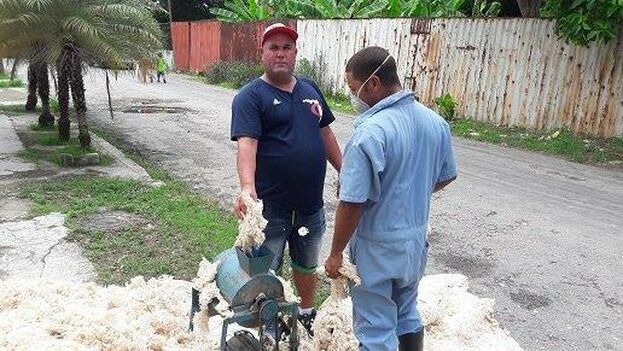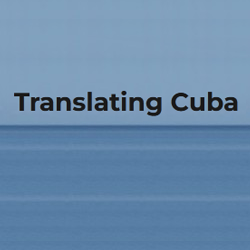Mattress repair, Cuba

Some mattress repairers have built electric machines that allow them to renew the wadding to fill the mattresses. (Revolico)
His hands move with agility, looking first for the scissors, then the thread and finally the needles to close the long cut made on one side. He is not a surgeon or a tailor, but a mattress repairman who, in the middle of a Havana roof, repairs that soft surface where later a couple will be sleep in peace, a child will romp or a grandmother will rest.
“There are two places in life where we deserve a good rest: the mattress and the coffin,” René Puerto reflects philosophically, like the mattress repairman with more than ten years of experience that he is. “In the coffin we do not realize it but a mattress can help us really get our rest, or it can be an ordeal.”
Puerto travels the Havana neighborhoods of El Cerro, El Vedado and Nuevo Vedado announcing his services. “I repair all kinds of mattresses.” He has in a small truck with two assistants and they bring with them all the tools necessary tools for their work. “We know people’s embarrassments,” he says.
“Most of the mattresses that I have to repair are over 40 years old but I have been faced with some older than 70,” Puerto explains to 14ymedio, Before making the switch to this particular job he was employed by a subsidiary of the Ministry of Domestic trade.
Ten years ago he obtained a license to practice as a mattress repairman on his own and he no longer imagines doing anything else other than straightening springs, placing a lining, and stitching and distributing the filling to make the mattress firm and fluffy.
Puerto charges about 50 CUC for repairing a mattress and claims to be able to do it in less than three hours. “That’s if I do not find surprises like too many broken springs or part of the outer wire frame split,” he clarifies. “This work requires patience but you also have to be very clever to solve problems that arise.” He considers that “each mattress is a mystery until it is opened.”
“I was always skillful with my hands and during the Special Period I dedicated myself to upholstering furniture but immediately I realized that if repairing a sofa is almost a luxury, repairing a mattress is a necessity and even people with less money are willing to spend a little bit to sleep better.”
Puerto’s team works on the most common models and types of mattresses in Cuba: bed, cradle, the so-called “three-quarters” and the enormous imperial ones. “We can repair the ones filled with wadding as well as those that are partly foam.” Although he says he prefers “the old mattresses with good springs that are no longer sold in the stores.”
“The most important thing is the mattress framework because the rest is the filling and what happens is that those they’re selling now look very nice but they do not last half as long as that mattress that my parents bought when they got married a lot of years ago,” says Puerto.
During the 70s and 80s, buying a mattress in Cuba was an almost impossible task. Through the rationed market, a few units were sold for newborns and couples getting married, but it was such a small number that it could not meet the demand. With the opening of stores in hard currency, in the 90s, the sale of mattresses reappeared.
Currently bed mattresses are for sale in the network of state stores at about 250 CUC (the equivalent of well over half a year’s salary for the average worker). The price in the informal market can fall by half but scams and adulterations are frequent. For many families, repairing an old mattress is the only affordable way to sleep more comfortably.
Juan boasts that he has taken the mattress repair business to a “higher level,” he tells 14ymedio. “Before, I used to do it on the sidewalk, in a parking lot or on a rooftop, but since I put an ad in Revolico — an online ad site similar to Craigslist — to work in peoples’ homes, I’m doing better and with fewer risks.” Before, he says, the police bothered him a lot because although he has a license “most of the raw material that is needed can not be bought legally.”
“Strong fabric for the lining, steel wire for the springs to be replaced and the wadding itself are not for sale anywhere,” he complains. “We do not have access to a wholesale market and we have to recycle and recover everything we can so as not to waste new materials, but in any case we lack the resources to be found on the street.”
In more than 20 years dedicated to the trade, Juan says he has seen everything. He relates that once a couple getting a divorce asked him to separate a mattress to make two personal mattresses. “The most difficult thing is when we have to work with mattresses where an old man or a sick person has been bedridden because then it has spots or smells bad.” Although Juan knows that in these cases the mattress can be a health hazard, he does not hesitate to repair it if he is paid.
“The day I suffered the most was when I visited my brother in Miami and several times I saw mattresses thrown in the trash, almost new,” he recalls. “I wanted to take them all and bring them to Cuba but I could not.” His brother, as a family joke, sends him pictures every now and then of other mattresses that he sees being thrown out on the streets of that city.
Other times unforeseen events are not so negative. “Once we bought an old mattress very cheap to get the springs and when we took it apart in the workshop we found more than 1,000 CUP in a roll.” The practice of keeping money under or inside the mattress (shoved through a gap) is common on an island where many continue to distrust state banks.
“We couldn’t even return the money because the mattress had reached us through several intermediaries and when we started asking nobody knew who the original owner was.” With that unforeseen treasure Juan bought a good electric motor to fulfill an old dream.
“Between my son and I, we created an electric machine that helps to renew the wadding, which helps a lot with the old mattresses where the stuffing has gotten hard in places,” he explains. “We give a one year guarantee and the customer can stay close by the whole time to see what we do and what materials we use, there is no cheating.”
Scams are very common in that sector, which is why Juan likes to act with transparency. “I had a good mattress that I inherited from my mother, she needed to change the outer fabric because it was stained and fix a couple of springs but nothing else,” says Marilú, a client who was the victim of a hoax.
“I made the mistake of not looking at what they were doing in the parking lot of the building, which was where they were repairing my mattress,” she recalls. “The first night everything went fine but then some balls started coming out and when I couldn’t take it anymore and I opened it up I realized they had exchanged all the original stuffing with sacks of dried grass and jute sacks,” she laments.
Now Marilú is saving to buy a mattress in the stores in convertible pesos and insists that she will try to take good care of it to avoid having to resort later to the repairers. “These people are like magicians: they can turn an old mattress into a wonder; or they can change it into a pile of garbage.”
___________________
The 14ymedio team is committed to serious journalism that reflects the reality of deep Cuba. Thank you for joining us on this long road. We invite you to continue supporting us, but this time by becoming a member of 14ymedio. Together we can continue to transform journalism in Cuba.
Translating Cuba

PROFILE
Translating Cuba is a compilation of translations of Cuban bloggers, independent journalists and human rights activists, primarily writing from the island. The authors included here share a number of characteristics. They:
- Write from the island of Cuba.
- Are independent, that is they are not paid by the Cuban government.
- Write under their own names.
- Their articles contain material of wide general interest.
What they don’t share is a single point of view. Our hope is that the voices on this site will mirror the free, open and plural society we all know that Cuba is ultimately destined to be.
Main Research Source
- Mattresses shouldn’t be thrown away, anywhere, ever
- It’s even possible to renew the cotton wadding

